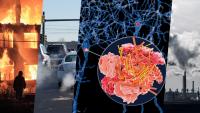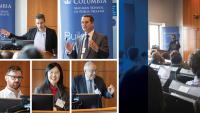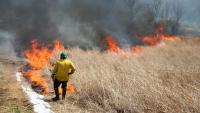Xiao Wu, PhD
- Assistant Professor of Biostatistics
On the web

Overview
He completed his Ph.D. in Biostatistics at Harvard University, where he was advised by Dr. Francesca Dominici and Dr. Danielle Braun. His dissertation focuses on developing causal inference methods to handle error-prone, continuous, and time-series exposures. He was a Data Science Postdoctoral Fellow at Stanford University, where he worked with Dr. Trevor Hastie and Dr. Stefan Wager during 2021-2022. He is also working on collaborative projects to design Bayesian clinical trials, meta-analyses, and real-world evidence studies.
He has been named to Forbes 30 Under 30 list. His research has been published in prestigious scientific venues such as Science Advances, New England Journal of Medicine, the Lancet Planetary Health, and the Journal of the American Statistical Association, and it has attracted the attention of international journalism, including at the New York Times, the Guardian, National Geographic, USA Today, and Scientific American.
Academic Appointments
- Assistant Professor of Biostatistics
Credentials & Experience
Education & Training
- BS, 2015 Mathematics, Peking University
- LLB, 2015 Laws, Peking University
- MS, 2017 Biostatistics, Harvard T. H. Chan School of Public Health
- PhD, 2021 Biostatistics, Harvard University
Honors & Awards
- 2024, Calderone Junior Faculty Award, Columbia Mailman School of Public Health
- 2023, Papers of the Year by NIEHS Environmental Factor, NIEHS
- 2022, Forbes Magazine 30 Under 30 - Healthcare, Forbes
Research
Research Interests
- Biostatistical Methods
- Causal Inference
- Data Science
- Environmental Health
- Statistical Machine Learning
Selected Publications
Wu, X., Mealli, F., Kioumourtzoglou, M.A., Dominici, F. and Braun, D., 2024. Matching on generalized propensity scores with continuous exposures. Journal of the American Statistical Association, 119(545), pp.757-772.
Wu, X., Weinberger, K.R., Wellenius, G.A., Dominici, F. and Braun, D., 2024. Assessing the causal effects of a stochastic intervention in time series data: are heat alerts effective in preventing deaths and hospitalizations?. Biostatistics, 25(1), pp.57-79.
Wu, X., Sverdrup, E., Mastrandrea, M.D., Wara, M.W. and Wager, S., 2023. Low-intensity fires mitigate the risk of high-intensity wildfires in California’s forests. Science Advances, 9(45), p.eadi4123.
Josey, K.P., Delaney, S.W., Wu, X., Nethery, R.C., DeSouza, P., Braun, D. and Dominici, F., 2023. Air pollution and mortality at the intersection of race and social class. New England Journal of Medicine, 388:1396-1404.
Wu, X., Braun, D., Schwartz, J., Kioumourtzoglou, M.A. and Dominici, F., 2020. Evaluating the impact of long-term exposure to fine particulate matter on mortality among the elderly. Science Advances, 6(29), p.eaba5692.
Shi, L., Wu, X., Yazdi, M.D., Braun, D., Awad, Y.A., Wei, Y., Liu, P., Di, Q., Wang, Y., Schwartz, J. and Dominici, F., 2020. Long-term effects of PM2·5 on neurological disorders in the American Medicare population: a longitudinal cohort study. The Lancet Planetary Health, 4(12), pp.e557-e565.
Wu, X., Braun, D., Kioumourtzoglou, M.A., Choirat, C., Di, Q. and Dominici, F., 2019. Causal inference in the context of an error prone exposure: air pollution and mortality. The Annals of Applied Statistics, 13(1), p.520.


